Media error: Format(s) not supported or source(s) not found
Download File: https://upstatephysicianssc.com/wp-content/uploads/2022/09/HL-Fearless-Advice-opt-2022.mp4?_=1In recognition of Breast Cancer Awareness, HealthLinks is launching a unique web series titled “Fearless” that features four South Carolina women who beat breast cancer and are now thriving in their own ways. Our hope is that the unique fortitude and resilience of these women help inspire others who face breast cancer and similar diagnosis.
The Simons: When Cancer is a Family Experience
October 31, 2022
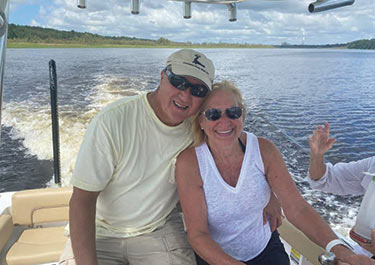 Dennis Simon, a naval officer and then a submarine navigator, was deployed at sea when his commanding officer decrypted a life-changing, urgent message about his wife, Patricia. She was only 33, but she had been diagnosed with breast cancer – the same hideous disease that had killed her mother at 42.
Dennis Simon, a naval officer and then a submarine navigator, was deployed at sea when his commanding officer decrypted a life-changing, urgent message about his wife, Patricia. She was only 33, but she had been diagnosed with breast cancer – the same hideous disease that had killed her mother at 42.
Simon remembered feeling overwhelmed. What if she did not survive? What if he had to raise their two young sons without her? What about his career with the Navy? He battled these fears as he flew home on the very next flight available from Andros Island and met her right before her surgery. All he could do was take one day at a time.
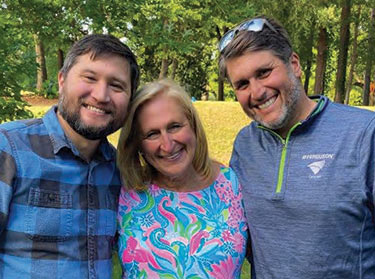 Like Harry McMillan, Simon found his personal faith to be a comfort and trusted that God would help him handle this time of family crisis. A particularly difficult moment occurred when Patricia, typical of so many women with breast cancer, finally voiced her fears that her husband’s love for her would be diminished because of her breast surgery. Simon gifted her with the perfect answer when he said, “You know, I’ve always been a leg man, and your legs are perfect!” He and their sons, Scott and Christopher, became the bearers of hope and laughter, especially during those difficult days when it was hard for Patricia to find it for herself.
Like Harry McMillan, Simon found his personal faith to be a comfort and trusted that God would help him handle this time of family crisis. A particularly difficult moment occurred when Patricia, typical of so many women with breast cancer, finally voiced her fears that her husband’s love for her would be diminished because of her breast surgery. Simon gifted her with the perfect answer when he said, “You know, I’ve always been a leg man, and your legs are perfect!” He and their sons, Scott and Christopher, became the bearers of hope and laughter, especially during those difficult days when it was hard for Patricia to find it for herself.
The fear of returning cancer is very real for all cancer survivors and their families. While 90% of those with nonmetastatic invasive breast cancer remain cancer- free at the five-year mark and 84% are still free at the 10-year anniversary, Patricia Simon has been part of the minority who has had to face a rematch. It has been six years since she won her latest battle with uterine cancer. Throughout each rough spot, Dennis Simon has operated on the simple principle of:
“Love your wife and support her. Life is a highway – there are many reasons to turn into the slower lanes or even stop at rest stops, but the important thing is to get to your destination.”
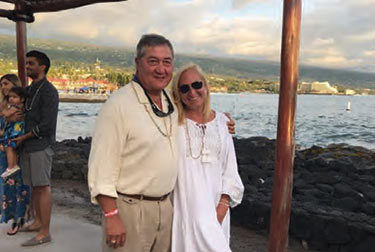 With his ever-abundant supply of love, hope and laughter, he continues to help navigate the Simon family safely in their life journey together.
With his ever-abundant supply of love, hope and laughter, he continues to help navigate the Simon family safely in their life journey together.
Currently, 3.8 million women in the United States are battling breast cancer, and the numbers are increasing by about 0.5% each year. The importance of the support of family members cannot be underestimated. In sharing their stories, Harry McMillan, Harmon Kerrison and Dennis Simon illustrate how tough families can go through tough times and emerge even stronger than they were before cancer reared its ugly head.
By Janet E. Perrigo
The Kerrisons: When Cancer is a Family Experience
October 17, 2022
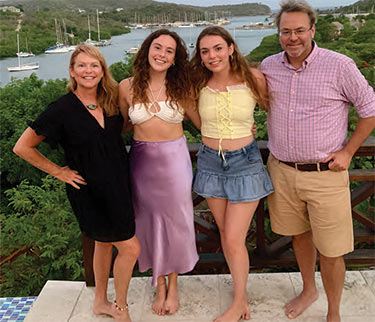 Harmon Kerrison was only 14 when her carefree, self-absorbed teenage world suddenly crumbled. It was at a typical family dinner where she noticed the unusual sadness in the eyes of her parents as her mom announced to her and her older sister, Legare, that she had been diagnosed with breast cancer.
Harmon Kerrison was only 14 when her carefree, self-absorbed teenage world suddenly crumbled. It was at a typical family dinner where she noticed the unusual sadness in the eyes of her parents as her mom announced to her and her older sister, Legare, that she had been diagnosed with breast cancer.
However, their mom, Hunter Kerrison, was not one to wallow in self-pity or to let her family fall into that place. She quickly determined that getting an excellent medical team was the most important step. With her entire professional life devoted to health care, she knew exactly who to call upon for the very best treatment protocols.
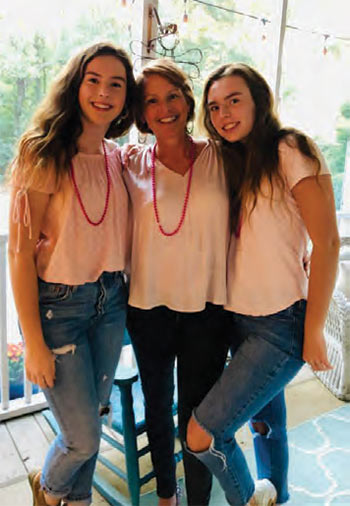 For Harmon, the Kerrison family dynamics suddenly changed. She remembers, “I disconnected from my personal, everyday activities – which no longer seemed as important – to spend time with my mom.” Some days seemed like being on an emotional roller coaster: “The days when Mom came home in severe pain and I could hear her crying, even though she tried to hide it, were the worst. Before, I always wanted to be out of the house with my friends doing my own thing, but now that felt selfish, and I wanted to be with my mom, doing things together with her instead.”
For Harmon, the Kerrison family dynamics suddenly changed. She remembers, “I disconnected from my personal, everyday activities – which no longer seemed as important – to spend time with my mom.” Some days seemed like being on an emotional roller coaster: “The days when Mom came home in severe pain and I could hear her crying, even though she tried to hide it, were the worst. Before, I always wanted to be out of the house with my friends doing my own thing, but now that felt selfish, and I wanted to be with my mom, doing things together with her instead.”
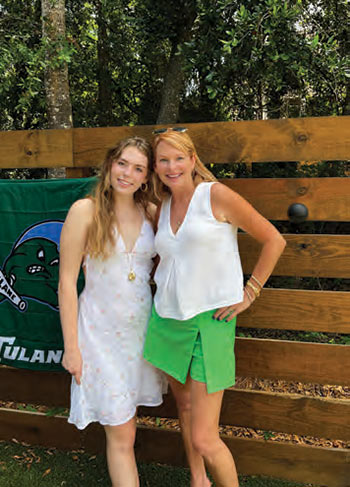 While the initial surgery was stressful, Harmon mistakenly assumed the worst was over. The beginning of chemotherapy, with the characteristic hair loss, nausea and other side effects was a second, unanticipated battle. Although her mother doggedly continued to work and tried to keep the family routines as normal as possible, the effects, of chemo challenged her self-sufficiency and her ability to maintain the professional attractiveness that her daughters were so accustomed to seeing. Observing her vulnerability was a new and painful experience. Harmon recently graduated from high school and is optimistically looking forward to majoring in architectural studies as a freshman at Tulane.
While the initial surgery was stressful, Harmon mistakenly assumed the worst was over. The beginning of chemotherapy, with the characteristic hair loss, nausea and other side effects was a second, unanticipated battle. Although her mother doggedly continued to work and tried to keep the family routines as normal as possible, the effects, of chemo challenged her self-sufficiency and her ability to maintain the professional attractiveness that her daughters were so accustomed to seeing. Observing her vulnerability was a new and painful experience. Harmon recently graduated from high school and is optimistically looking forward to majoring in architectural studies as a freshman at Tulane.
“I am changed. I am much more mindful of life and of setting the right priorities,” she said. “I feel more mature. My mother and I did so many fun things together during her battle with cancer that our relationship is much stronger and more adult-to-adult now, but I do sometimes worry about what if it comes back.”
If she were to advise other teens dealing with a parent with cancer, she would encourage them to get deeply involved and go to appointments and treatments, even if that means pushing the boundaries a little. The times she devoted to her mom have enriched their relationship, and for this young woman, family is now a top priority.
By Janet E. Perrigo
The McMillans: When Cancer is a Family Experience
October 17, 2022
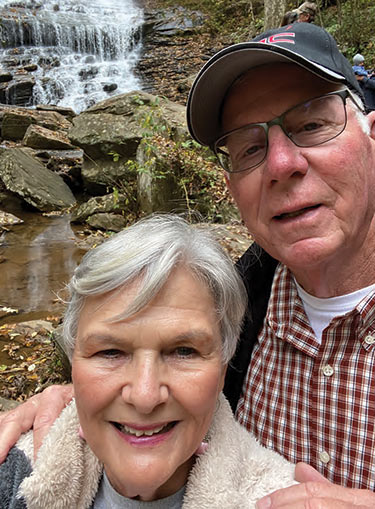 For Harry McMillan, when his wife’s routine breast lump removal unexpectedly disclosed a tiny hidden cancerous tumor, he reacted with shock and disbelief – but feelings of helplessness were close behind. For more than 50 years, McMillan has taken seriously his role of family protector and provider. But back then, Cathy, the person he loved most in the whole world, was being attacked, and he could do nothing to stop the invasive onslaught.
For Harry McMillan, when his wife’s routine breast lump removal unexpectedly disclosed a tiny hidden cancerous tumor, he reacted with shock and disbelief – but feelings of helplessness were close behind. For more than 50 years, McMillan has taken seriously his role of family protector and provider. But back then, Cathy, the person he loved most in the whole world, was being attacked, and he could do nothing to stop the invasive onslaught.
However, there were other things he could tackle, including personally notifying the couples’ two adult sons, who have always been very close to their mother. There were also the endless consultations and appointments.
“I struggled with seeing her being stuck and prodded, and that was very emotional, but I never missed a one of them,” he reminisced. “Cathy says that I was also supportive by doing things around the house when she wasn’t able to and hiding her car keys so she couldn’t slip off and go to work when she needed to stay home.”
Cathy McMillan is a strong woman who does not cry or give in to her emotions easily. For her husband, it felt like she truly did not need his support as much as some women might in this circumstance. Her refusal to lose hope, her faith and her perseverance kept despair at bay, even during the difficult times. When the thought of losing his beloved wife elbowed its way into his mind, McMillan responded by sending up prayers on her behalf.
It’s been 15 years, and Cathy is now well past the five-year and 10-year survivor anniversaries. For Harry McMillan, the experience has made him realize,
“When you get wrapped up in daily living, you can forget what is important, and an experience like this brings you back to Earth real quick.”
By Janet E. Perrigo
Rising Above Cancer With Strong Values and Unshakeable Strength
October 10, 2022
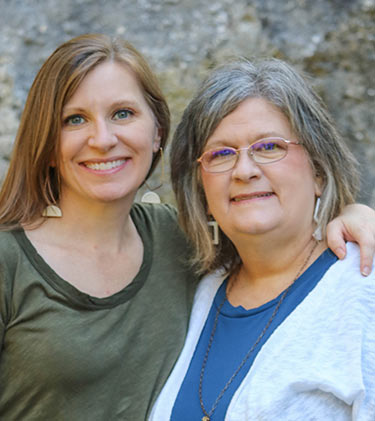 When cancer strikes, many unknowns cloud the mind, but cancer survivors often note that their values and their unshakeable strength carry them through.
When cancer strikes, many unknowns cloud the mind, but cancer survivors often note that their values and their unshakeable strength carry them through.
This is true for Cynthia Conrad, 63, a mother of four, who was diagnosed with Grade 2 Invasive Carcinoma on September 10, 2021.
Conrad remembers having pains soon after she returned from her family’s annual upstate New York getaway. She discovered a lump on her left breast and felt “shock and fear.” Conrad was unaware that anyone in her family had breast cancer, and she did not know what the next steps would look like.
Women should occasionally perform a breast self-examination in addition to mammograms, according to MayoClinic.org. Self-examinations help women better recognize any changes in their breasts that must be disclosed to their doctors. A breast self-examination includes visual and physical scanning, looking for dimpling, changes in size or shape, lumps, and more.
Fortunately, Conrad’s team of doctors, a surgeon, oncologist, and radiation oncologist, caught the cancer early and were able to begin treatment.
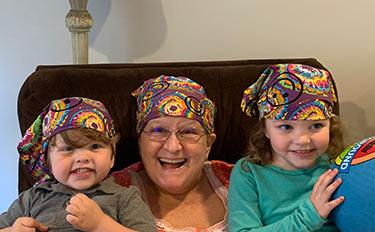 Conrad’s daughter, Alicia Duncan, shared the struggle her selfless mother faced when diagnosed: “My mom raised four children and has always put others before herself,” she says, “it took a toll on her knowing she would have to rely on others.”
Conrad’s daughter, Alicia Duncan, shared the struggle her selfless mother faced when diagnosed: “My mom raised four children and has always put others before herself,” she says, “it took a toll on her knowing she would have to rely on others.”
Conrad’s journey through treatment has been difficult, consisting of procedures, chemotherapy, and unimaginable side effects, but she says it “has not been anything I can’t deal with.”
She believes that those who have not had cancer cannot fully understand the hardships: “You feel so bad when you hear that word for someone else…until you’ve gone through it and experienced just about every kind of side effect you can imagine…I’m at a loss for words.”
Conrad was declared a “no evidence of disease” patient following her lumpectomy, which confirmed that no cancer was found in any of her lymph nodes. Currently, she is undergoing a hormone inhibitor treatment every three weeks, called Anastrozole, or Arimidex, which should decrease the amount of estrogen her body generates. She is approaching her final treatment in October 2022.
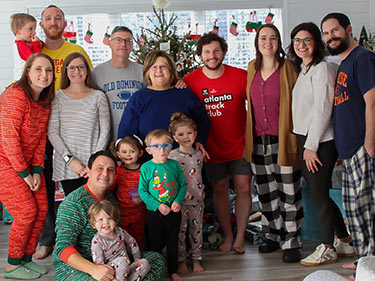 Throughout the fears and unknowns of cancer treatment, Conrad leaned on the constants in her life: God, her husband, and her family and friends.
Throughout the fears and unknowns of cancer treatment, Conrad leaned on the constants in her life: God, her husband, and her family and friends.
Conrad’s relationship with God flourished during her treatment.
She says, “It’s made me pray more and harder than ever before.”
The prayers from her family and friends, as well, gave her a sense of hope. Conrad relied on this strength, especially with a friend who consistently prayed for her when she was “so weak.”
Although Conrad has an uplifting support system, she says she still suffers from survivor’s guilt. Her fight with cancer and losing friends to cancer has enlightened a new perspective: “It’s made me more compassionate towards the word ‘cancer’ and to people when I hear they have it.”
“She fought every step of the way, and really came out of the fight knowing she wanted nothing more than to be with her family,” her daughter, Alicia, says. “This fight has really shown her how important it is to cherish those around you.”
By Riley Mathews
Fearless: Three Stories, One Truth About Breast Cancer
October 1, 2022
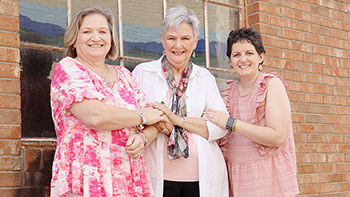 There is no single answer to the multitude of questions that come with news that you have cancer. Each reaction, choice, outcome is as individual as a unique fingerprint.
There is no single answer to the multitude of questions that come with news that you have cancer. Each reaction, choice, outcome is as individual as a unique fingerprint.
When Lynne Pryor, 58, learned that she had Stage 1 invasive ductile carcinoma on December 5, 2008, “How am I going to get through this?” Will it ever come back? What would happen to my children?” were the questions that haunted her.
“I was, 31 years old with a newborn baby at home, said Caitlyn Harper, 32, who was diagnosed with Stage 2B invasive ductal carcinoma on July 21, 2021.
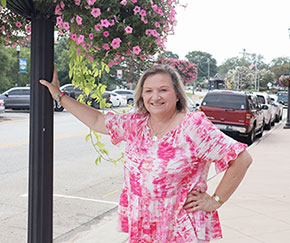
“After the words ‘you have cancer,’ I wanted to know if I was going to still be around for him – his first birthday, first day of school etc. Would he ever know his mama?” Harper added. “Then of course, the why or the how. The why was the biggest question for me. Why is this happening, why me?”
Cathy McMillan, age 71, also remembers asking, “What is the purpose, God’s purpose? Why do I have this?”
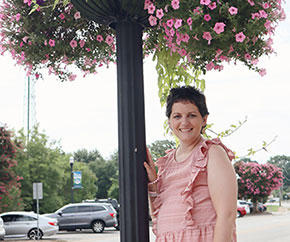
While their questions and each of their paths to remission differs, there is one resounding truth that McMillan, Harper and Pryor share: the flow of love and support that unfolds throughout a cancer journey is overwhelmingly beautiful.
“People brought food, they came to sit with my kid, someone cut our grass from summer through fall,” said Harper. “They just showed up; this loving army of people showed up.”
“We ate casseroles for years,” echoed McMillan, who first learned that she had a Grade 3 tumor (hormone positive, HER2 Nu positive) in 2006. “And the gorgeous flowers…knowing people cared for me – some that I didn’t even know cared – was an overwhelming joy.”
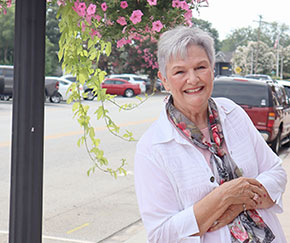
“… meals, flowers, gift cards and many personal “pick me up” notes,” Pryor said as she inventoried the generosity and love she experienced. “Each Monday evening for over a month, a friend sent us Papa John’s pizza. That was the highlight of my children’s day. They would say, ‘Oh mom- the delivery man comes tonight!’ ”
All three women live in upstate and have known each other, or about each other, for years through church and town events, including Relay for Life. As breast cancer survivors, they recently gathered for a group interview.
They hope that by sharing their journeys and advice, they can help other cancer fighters face their own unique questions, choices and outcomes with less fear and more hope.
What advice would you offer women who are fighting cancer now?
- Always be persistent and do not wait for doctors to see you in a couple of months. You know your body and you must be your own advocate. Always hold your head high and “fight like a girl!” – Lynne
- Have faith in your medical team and ask questions. Try to keep active and do as much physical activity as you feel that you can. I had a treadmill and I walked whenever I could and felt like it.- Cathy
- Keep going. As hard as it is, as sick as you may be, as tired as you may be, keep going. Live your life as if you don’t have cancer, except on treatment days. My oncologist told me that at my very first appointment and it has stuck with me to this day. – Caitlyn
Best tip for women dreading hair loss.
- Own it! Yes, it’s an extremely hard transition and I had plenty of meltdowns over it. The best thing I did was just reminded myself that this was just an unfortunate part of the process, and it would grow back. – Caitlyn
- Take advantage of the Feel Good/Look Good program that the American Cancer Society has. It made me feel so much better about the hair loss. At work, I was bald and my coworkers were very supportive. When I visited a school, I wore cute hats because I didn’t want to scare the little kids! I’ve always loved to wear hats so it was not a hardship. – Cathy
- Visit your local Cancer Association office and introduce yourself, tell them what type of cancer you have and see what they have to offer. You can get wigs, bandanas, scarves and beanies. And believe me, with a bald head you do get cold as you sleep, the beanie came in really handy. – Lynne
What did you learn about yourself?
- That it is okay to say I need help and I can’t do this by myself. I was very independent and never wanted to ask for help. I learned that I had to ask for help because I didn’t have the strength to do it by myself and that is okay. You don’t have to be a superwoman all the time. – Cathy
- That I am stronger than I ever thought possible. There were many nights I wanted to just give up, but I had to stay strong for my family and myself. – Caitlyn
- That sometimes we all experience “bumps in the road” and I feel I was chosen to witness to other ladies that are experiencing some of what I went through. – Lynne
What else was happening in your life (career, personal life) was unfolding at the time you learned that you had cancer?
- I was the Coordinator of Middle School Programs and a long list of other responsibilities for District One Schools, Spartanburg County, SC. I was responsible for the district’s 5 year Accreditation Review and Process with AdvancED (formerly Southern Association of Colleges and Schools), a new format that I had introduced to the district and so I felt totally responsible for making sure that it was a success. Our visit was scheduled for March 2007. We were in the middle of training and “self-study” when I was diagnosed. The large narrative had to be written and proofed for submission by February 1, 2007. The timing could not have been worse for me personally. – Cathy
- I had just given birth to my first son on June 28th 2021. During the time that I found out about my cancer, I was also taking care of a newborn and recovering from a c-section. COVID was still an issue at that time as well. Thankfully, it wasn’t as strict as in the beginning, so my husband was able to go to appointments with me. – Caitlyn
- At this time of my life, I had 3 children, Phillip, Will and Laura. I was fully involved with my family and husband, Barry, working part time within Spartanburg First Presbyterian Church Weekday School. I thoroughly enjoyed my position in the 2-year-olds classroom, which had to abruptly stop at Christmas break. Facing a full regimen of Chemo beginning the first of February, there was no way I could expose myself to children with just the common cold. Thus began a very emotional journey, but a determined one. I am also a professional watercolorist, but during this time I couldn’t concentrate on my painting. I could only focus on what was next with my medical journey. – Lynne
What was your favorite food and/or drink when you had cancer?
- We laugh about this. I had cravings for Mexican food and anything “white”–mashed potatoes, rice, grits, pasta. My go-to-food was the chicken noodle soup that is made by our local sandwich shop, “Delightful Dishes” in Inman, SC. Two to three days after a treatment, that was the only thing that I could get down. They don’t have chicken noodle soup on the menu but on certain days of the week. The owner personally made a gallon of it for me and put it in containers that could be frozen so I had a personal stock. – Cathy
- My favorite food is a fillet mignon and my soda of choice would be a regular coke. During treatment I loved anything cold, especially salads. And I could tolerate more garlic and onions than ever before, mainly because I had very little taste. Overall, I didn’t have much appetite during my treatment. – Lynne
Two time buster tips during chemo:
- I usually slept or watched TV. Later during Herceptin treatments, I would take my laptop and work. – Cathy
- I spent my time reading, browsing thru magazines and sometimes taking a nap. I usually made a list of things I wanted to accomplish that week . I would even write notes or return phone calls that I had missed. I usually had a warm blanket because of the solution they used before the drugs would always chill me. Of course, the nurses always had snacks to pass the time away with also. – Lynne
- Reading and watching a movie or TV show were primarily what I did to pass time in the treatment chair. – Caitlyn
What were some specific examples of joys that unfolded for you while you navigated cancer?
- The realization that people cared about me and were praying for me. My coworkers and the school staff were amazing. Also, the realization that God was with me and would see me through the experience. – Cathy
- A few of the joys I experienced I would say were the people I met and the friends I made during my journey. I am one of five girls, so I am blessed with sisters. But during this experience, I gained many more sisters, they are my survivor sisters. And another joy I had the opportunity to do, was illustrate a book for a friend of mine. Although this was a new route for me as an artist, the timing was perfect and thoroughly enjoyed the process. – Lynne
- You could tell God had His hands in everything and that brought me joy. I just knew that this was just a roadblock in my life that I was going to have to fight through. And somehow, someway my story would someday help others through similar journeys. – Caitlin
What were some of the questions that swirled through your mind when you found out you had cancer and as you went through your treatments?
- Being told your cancer is aggressive and must be treated aggressively was scary. Until I had all the scans and tests, I was scared to death that the cancer had spread. This was near Thanksgiving and my thoughts ran to…..is this my last Thanksgiving? My last Christmas? Will I never see grandchildren or my sons married? – Cathy
- How am I going to get through this and will it every come back were major questions that always stayed with me. The fact that it can always comes back still bothers me, but you must go on with your life. And what would happen to my children? I had a super supportive husband and family, then and now and I am sure if something had happened to me they would have been well cared for. My family exists of a doctor, several nurses, pharmacists and a breast cancer research professional, so I was always able to reach out with many, many questions or concerns. They were always just a phone call away. I was never given the chance to wonder “what if”, it was always “when you finish treatment”- Lynne
- I think most everybody that gets a diagnosis of cancer thinks the same thing: “am I going to die?” For me, this was no different. Here I was, 31 years old with a newborn baby at home, hearing the words “you have cancer.” I wanted to know if I was going to still be around for him. His first birthday, first day of school etc. Would he ever know his mama? Then of course, the why or the how. The why was the biggest for me. Why is this happening, why me? But like I said before, I knew that this was all part of His plan, and we all know that His plan is way bigger and better than we could ever imagine. – Caitlyn
How would you answer those questions today?
- God has allowed me to live almost 16 years cancer free. I’ve seen both sons happily married, achieve some fantastic life goals and become husbands and fathers. I have 3 beautiful grandchildren. My goal now is to live long enough to see them graduate from high school! Of course, one never forgets that breast cancer could come back. That is a reality that you live with but you don’t let it control your thoughts and your life. It does make me be more vigilant about getting things checked out and keeping up with regular doctor visits and screenings. – Cathy
- I believe today that sometimes we all experience “bumps in the road” and I feel I was chosen to witness to other ladies that are experiencing some of what I went through. – Lynne
- I don’t think there is an answer for any of those questions, even now with treatments being completed. It’s not in our hands, so we don’t have those answers. – Caitlyn
Please describe the importance of your medical team.
- They were the rock stars. I felt very confident in them the entire time. Our Gibbs Cancer Center in Spartanburg is awesome and was affiliated with M.D. Anderson in Houston so my case and tumor were discussed with them and they consulted in my treatment plan. My oncologist was super and his nurse was the most caring and on top of things. We laugh because being school administrators, we know people everywhere and the staff in the infusion center and the hospital is made up of many of our former students. I was my main chemo nurse’s elementary school principal. I felt so rewarded with knowing that students I had taught or impacted were now taking care of me. That is a very rewarding feeling. – Cathy
- My medical team at the Gibbs Cancer Center was awesome. Dr. Asim Pati was my oncologist, I believe Cathy and I actually were both his patients… He, along with the nurse practitioners and the infusion nurses guided me through a very difficult time. The nurses were great when I had questions and pushed me to ask the doctor for different directions we could go with my treatment. At one point, we had to cut back on the amount of drugs due to the neuropathy that was beginning in my fingers and toes. I had to learn not to be afraid to ask for guidance. One thing I know for sure is you must be your own advocate when it comes to your healthcare. – Lynne
- My medical team was the most fantastic group of people I have ever encountered. Prisma Health Breast Center: Dr Joe Stephenson (Oncologist) and Dr John Rinkliff( Surgeon); St Luke’s Infusion Center: Nurse Practitioners Savannah Hightower, Kelly, Lacy and Harriett. From my first appointment at the breast health center, I never felt like just a patient, or just a number. I felt like I mattered, and to me that made a world of difference. My infusion center team welcomed me in with open arms and treated me like I was a family member. To say I was blessed to have these people on my side is an understatement. – Caitlyn
Throughout your cancer journey – from diagnosis, through treatments, to remission- how did you support yourself (what helped you feel more calm and/or hopeful)?
- While I was in the hospital waiting on my mastectomy, I had an experience where the Holy Spirit visited me and spoke to me. He said to me, “Cathy, it will be okay.” Through the whole experience, my faith kept me calm and confident because I knew that no matter what happened, He had told me it would be okay! – Cathy
- Keeping as much normalcy in my life as possible was the biggest way I supported myself. I’m the type of person that makes jokes at inappropriate things (haha), so I was always making jokes about my cancer/bald head etc. I tried to keep a positive outlook and well, have fun. It wasn’t going to go away or get better with a bad attitude so I made a choice to not have one. – Caitlyn
- My sister is a retired nurse who worked in oncology for 10 years and was also a patient of my oncologist for a blood disorder. She picked me up and took me to breakfast before every treatment and then drove me to Gibbs. She questioned me and kept on top of how I was feeling. Since she knew the medical staff in the oncologist’s office, she made sure to ask questions and listen when the nurse or the doctor was explaining things. – Cathy
What were the best forms of support from others?
- My family exists of a doctor, several nurses, pharmacists and a breast cancer research professional, so I was always able to reach out with many, many questions or concerns. They were always just a phone call away. I was never given the chance to wonder “what if”, it was always “when you finish treatment.” – Lynne
- My administrative assistant at the time was Renee Bell. While I was home for about 3 months, she kept things running in our office and came to my home to bring work for us to go over. I was still working on this big project and she kept things going and we never missed a beat thanks to her. She would go by Delightful Dishes and pick up the chicken noodle soup for me and she is the one who got the owner to make my own special batch. – Cathy
- My husband was my biggest supporter. I could not have gone through this journey without him. He stepped up in so many ways, I couldn’t even begin to list them all. My parents were a close 2nd. They would keep my son for me so I could get rest, prepare meals, clean, do laundry etc. I wouldn’t even have to ask, they would just do. I no longer work for this company( I left to stay home with my son) but my place of employment at the time(Palmetto Eye and Laser Center of Boiling Springs SC) was a huge support for me. I worked throughout my whole chemo treatment time. They worked so well with me when I needed time off for appointments, left early to go home when I didn’t feel well, did fundraisers for me and just loved on us and prayed with us. They were such a blessing to me, and I know that it was no mistake that I worked there during this journey. – Caitlyn
Name: Cathy McMillan
In remission: 16 years in October
Name: Lynne Pryor
In Remission: 14 years in December
Name: Caitlyn Harper
In remission: 9 months in October
By Lisa Moody Breslin
Let Hope Permeate Your Journey
October 29, 2021
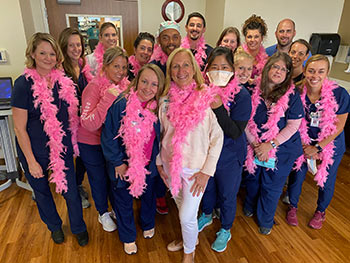 Not long after cancer patients receive their diagnosis, one question starts to cycle into many others: Will it return?
Not long after cancer patients receive their diagnosis, one question starts to cycle into many others: Will it return?
This was certainly one of many questions for Patricia Simon, the director of Trident Medical Center’s Inpatient Rehabilitation Unit, when she learned she had breast cancer 34 years ago. She was 33, and breast cancer had taken the life of her mother, Margaret, at the age of 42.
Simon’s cancer was detected at stage 1, and, because medical advances offered more hope for survival, she believed she could win the battle her mother lost. But “Will it return?” remained a question.
“Once you have cancer, even a sore thumb makes you think that cancer is returning,” Simon said. “I had more than 20 years of a nursing background in women’s health, but I still worried about recurrence.”
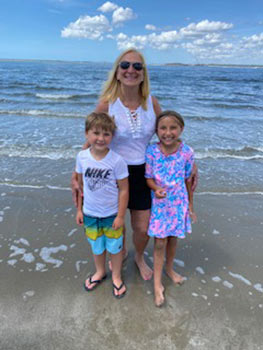 Unfortunately, for Simon, cancer came back.
Unfortunately, for Simon, cancer came back.
Grateful to be in remission for six years now, she successfully fought breast cancer and uterine cancer, which doctors confirmed were totally unrelated.
Her advice to women who have to fight the cancer fight comes from her journey as a multiple cancer survivor. It echoes the advice of other survivors but with a little more emphasis on the power of hope and the joy of immense support from family members, whether by birth or through support groups.
“I’m a positive person to begin with, and I know that helped a great deal,” Simon said. “You have to push back the questions like ‘Will it return?’ and ‘Can I take this?’ with hope and positivity.”
Over half of breast cancer survivors experience moderate to severe levels of fear of cancer recurrence; this grows to up to 70% among younger breast cancer survivors, according to research conducted by New York University in 2021.
The NYU research backs Simon’s advice about the benefits of hope and a positive attitude.
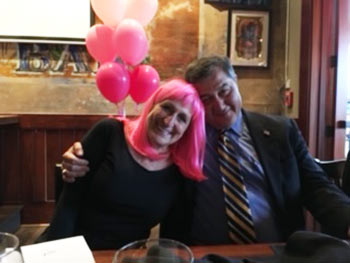 Among the women who participated in the NYU studies, “a greater fear of cancer recurrence was associated with higher distress, anxiety, depression, lower quality of life and certain beliefs about their cancer, including worse perceived consequences and greater emotional response to illness.”
Among the women who participated in the NYU studies, “a greater fear of cancer recurrence was associated with higher distress, anxiety, depression, lower quality of life and certain beliefs about their cancer, including worse perceived consequences and greater emotional response to illness.”
“Having hope is so important,” Simon said. “If I had a hard time finding it, my husband, Dennis, and my children, Scott and Christopher, brought it to me. They brought me hope and laughter.”
Simon fondly recalled one of her husband’s responses to the news about her breast cancer. As a Naval officer, he was deployed on a submarine at an undisclosed location and returned as quickly as possible.
“During a Reach to Recovery meeting, a counselor asked him if there was anything he was worried about,” Simon said. ‘“Not really. I’m a leg man,’ he joked. I always knew he was a leg man. In the moment, his response was perfect. We both laughed.”
Simon is quick to note that when family members are not available, cancer survivors are a family filled with members who are eager to offer emotional and practical support around the clock.
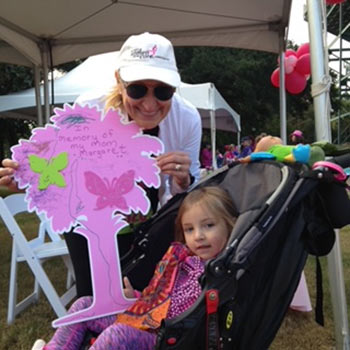 Specifically, Simon tipped her hat to the Susan G. Komen Foundation family; she worked for the Foundation for 20 years, five as its president, and she remains an ardent fan of the resources, events and funding available to anyone fighting cancer or thriving after cancer.
Specifically, Simon tipped her hat to the Susan G. Komen Foundation family; she worked for the Foundation for 20 years, five as its president, and she remains an ardent fan of the resources, events and funding available to anyone fighting cancer or thriving after cancer.
“It is so important to reach out and find someone you feel comfortable sharing your fears with,” Simon said. “The Foundation is one among many resources to connect with in order to create your support team and find answers.”
As a multiple cancer survivor, Simon confirmed the importance of finding the perfect balance between listening to the advice of doctors and listening to yourself.
Listening to her own body, to everything she knew as a nurse and her instincts, she moved swiftly when she discovered a lump on her breast.
“I coached T-ball, and the son of my OB/GYN, Dr. Jimmy Martin, was on the team,” Simon said. “During a Saturday practice, right after I found the lump, his wife noticed how tired I was. When she learned that I had been up all night worrying, I had an appointment that same day.”
Years later, Simon listened to her GYN oncologist, Dr. Ward Katsanis, and got tested for uterine cancer before the Christmas holiday rather than after.
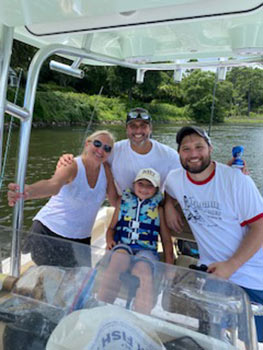 “We were all shocked by the result,” Simon said. “After breast cancer, I got tested for the gene that indicates my cancer risk. (BRCA1/2 mutation screening). I didn’t have it.”
“We were all shocked by the result,” Simon said. “After breast cancer, I got tested for the gene that indicates my cancer risk. (BRCA1/2 mutation screening). I didn’t have it.”
“Dr. (Steven D.) Shapiro told me not to get overconfident because there are so many other genes linked to cancer that are not picked up by that test,” Simon added. “He was right.”
In 1996, BRCA screening became the first genetic test for cancer risk.
In October 2011, long after Simon’s cancer, a genomic test that is used to predict the likelihood of cancer recurring in women with early-stage hormone receptor-positive breast cancer – Oncotype DX – became available.
Simon has opted not to have the Oncotype DX screening. Instead, she sees her oncologist, Dr. James Orcutt, a medical oncology and hematology specialist for screening once a year. She savors the relief that comes with the news that she is all clear.
“I always turn toward hope,” Simon said. “Everyone with cancer has to seek and then cling to hope.”
By Lisa Moody Breslin
Cancer Carries Its Own To Do List (It’s Ok Not to Get It All Done)
October 22, 2021
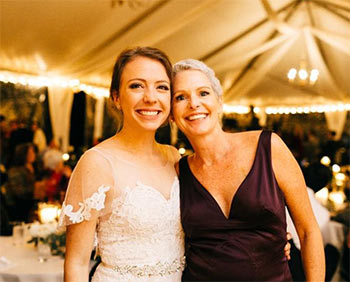 As the founder and president of HHK Healthcare Marketing Specialists, Hunter Kerrison is no stranger to To Do lists, the challenges of balancing work and family life, and her own sources of peace.
As the founder and president of HHK Healthcare Marketing Specialists, Hunter Kerrison is no stranger to To Do lists, the challenges of balancing work and family life, and her own sources of peace.
HHK, a consulting firm specializing in strategic marketing services for healthcare-related organizations, launched in 2001. Kerrison’s entire professional life before that launch was rooted in translating the language, the complexities, emotions, and policies for hospitals and healthcare systems, Bon Secours-St. Francis Xavier Hospital, Trident Health System among them.
Yet, in 2017, at the heart-dropping moment when she learned she had breast cancer, she couldn’t translate the words. She was on the other side; suddenly she was a patient .
“I had a moment of panic. I froze and eventually thought, ‘What next?’” Kerrison said. “The excellent thing about being frozen is that it pushed me to turn to all the amazing doctors in my contact list.”
Kerrison is one of the few cancer survivors whose story is spared the punch line “until she had cancer.”
She kept running her company – a company that hit its 20th anniversary this year. She continued to enjoy family time with her daughters, Legare and Harmon, and her husband, Lea.
The priorities on her To Do list just shifted and expanded when cancer hijacked her body.
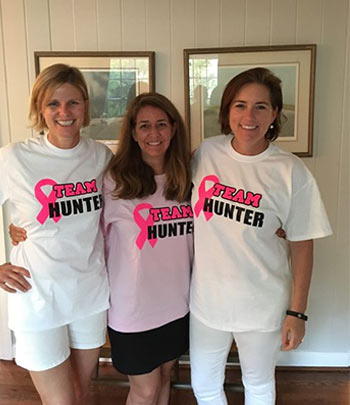 “I’ve loved working my whole life ,” Kerrison said. “With a full-time job and motherhood, there are plenty of times both looked messy. I already knew messy is ok at times.”
“I’ve loved working my whole life ,” Kerrison said. “With a full-time job and motherhood, there are plenty of times both looked messy. I already knew messy is ok at times.”
So when things got messy while balancing cancer, motherhood and work, she rode it out.
“Everything is harder, but it’s doable,” Kerrison said. “You have to be gentle and kind with yourself and lean on your village as much as you can. “
“Working kept my mind on something other than cancer,” she added. “I didn’t want to become breast cancer. It becomes a priority and you have to embrace it, but I didn’t want to become breast cancer.”
Full-time career, full-time mother who loves her family life, perhaps the best way to share the lessons, laughter and gratitude that fill Kerrison’s cancer journey is through a heart-warming To Do list.
Gleaned from conversations with Kerrison, the list for those who are battling cancer begins:
Cancer To Do List
Build Your Own Team
“Creating a care team of doctors and specialists is the very first hurdle,” Kerrison said. “Select the people who will really be there to support you, help you map out your treatment plan and your opportunities.
Cancer calls for “multi-layered decisions,” she added. “I have not met any two people whose treatment plan looks the same. The protocols are that varied. You need to customize your care team the same way.”
Tapping the wealth of experts that she knew, Kerrison created a team from a variety of specialists and surgeons rather than falling in line with specialists and surgeons from one health care system.
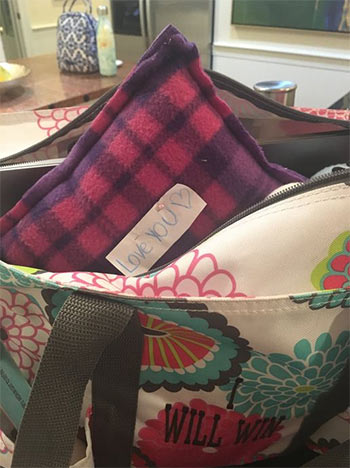 “I was not afraid to step outside of one singular network,” Kerrison explained. “I didn’t feel limits of using just MUSC, Roper and others. I did a hybrid approach to building my team, knowing that my heart is with the independent practitioners.”
“I was not afraid to step outside of one singular network,” Kerrison explained. “I didn’t feel limits of using just MUSC, Roper and others. I did a hybrid approach to building my team, knowing that my heart is with the independent practitioners.”
Filled with immense, continued gratitude for her team, Kerrison interjects shout outs as she described it.
Accolades for Dr. Meghan Baker, a high risk breast cancer specialist in Mt. Pleasant, and Dr. Richard Kline Jr. who is with the medical team at East Cooper Plastic Surgery, are too numerous to count as Kerrison discussed her multi-disciplinary team. She also credited her oncologists, Dr. Julia Saylors and Dr. George Keogh [Charleston Oncology], for returning her to health and offering happiness along the way.
“I called my OB-GYN, Dr. Molly Joseph first,” Kerrison said. “As with most women, my OB-GYN is the gatekeeper to the rest of my health. Mine rose to the occasion and helped me pull together the rest of my team.”
Take advantage of the teams of survivors
“I have nothing but amazing things to say about my care team, but the minute you become an unfortunate card-carrying member of Breast Cancer Club, you have a world of support all around you,” said Kerrison. “In person, via calls, emails and social media paths, we field and ask the questions that keep you up at night.”
She remains grateful for the community and further describes it as “this amazing village of women who are all about paying it forward. It is worth availing yourself to the village when you become an inadvertent member of the club”
Let go of all expectations that you can be your best, mutli-tasking, caregiving self
“While I’m proud of continuing to be there for my clients, brain fog is a real thing,” Kerrison said. “I write television scripts, blogs, and web content and these are things that I was typically able to do in less than an hour.”
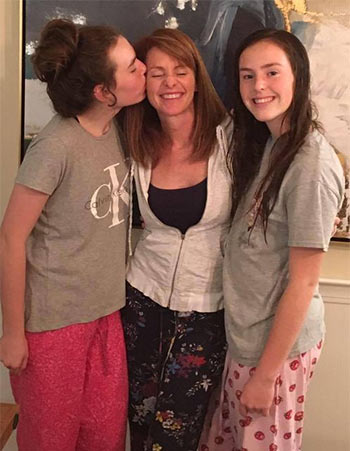 “With cancer’s brain fog, I would stare at blank pages for hours,” she added. “I remember thinking ‘this is how I’d feel if someone plunked piles of tax paperwork in front of me.’”
“With cancer’s brain fog, I would stare at blank pages for hours,” she added. “I remember thinking ‘this is how I’d feel if someone plunked piles of tax paperwork in front of me.’”
Kerrison had to recognize that she couldn’t do everything at once, and what she could do didn’t have to be perfect.
She spins a (now) hilarious tale about getting ready for a big event while feeling nauseous, and trying to find the outfit that covered her chemo port and other tubes. She was also wrestling with a wig for the first time.
“I didn’t want to distract people and a bald head does that,” Kerrison said. “I kept trying to get dressed. I had drains from a surgery and no hair- and I wanted to look professional.”
During the wig wrestle, Kerrison realized she was “violently allergic, humorously allergic” to the wig.
Wig on, sneeze. Wig off, no sneeze. Wig on, sneeze.
Ultimately, she realized that “a scarf would have to do.” Her daughter, Legare, had learned all kinds of cool things to do with a scarf, so the backup plan was ready, Kerrison said.
“So I learned to rock the bald head with scarves and hats,” she added. “You have to let go of all notions that anything can be neat and tidy. Doing your best has to be enough.”
Seek Your Individual Comfort
Throughout Kerrison’s journey, she discovered unique sources of comfort that she would cling to during her toughest times. Heads scarves become an early source of comfort.
Her daughters also made her a sock monkey and a sock elephant that accompanied her to treatments and surgeries. They made signs and flung them up as a welcome home from every treatment as well.
These comforts were two of several that “lit up the darkness in my journey,” she said.
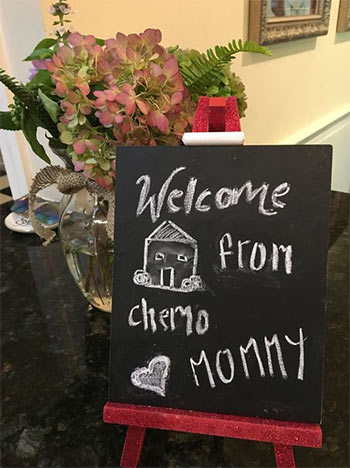
Pick Up Healthy Diversions
Kerrison picked up new hobbies and interests while cancer redirected her life. She baked a lot with her daughter. Together, they also explored cancer fighting foods and their interest morphed into a blog they shared with a small group of people.
She saved every gift and card she received and then archived them in a creative gift ideas blog.
One of the very first question folks ask me is, ‘What should I do for my friend or family member,?’ and “What should I give them?’’
Someone pulled together Kerrison’s chemo bag for her, so now she creates one for close friends.
“Sometimes you write and wonder if your card matters, it does,” she said. “Everything you do and give matters.”
Kerrison is thankful for two years of remission from cancer. She considers the word fearless inseparable from every cancer journey.
“Whether you are immersed in family, your career, your own health, you have to walk the journey with a fearless mindset or you won’t feel alive while you have cancer.”
By Lisa Moody Breslin
‘Anncredible’ Answers to Cancer
October 15, 2021
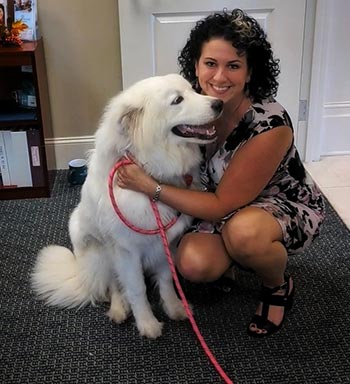 Ann Peart describes herself as a single mother – in love – a jack of all trades, a stage 4 cancer survivor and a natural health advocate. Her journey to these roles is a story of resilience, self-advocacy, endless hours of research, vulnerability and a social media push to gather and share as much information as possible.
Ann Peart describes herself as a single mother – in love – a jack of all trades, a stage 4 cancer survivor and a natural health advocate. Her journey to these roles is a story of resilience, self-advocacy, endless hours of research, vulnerability and a social media push to gather and share as much information as possible.
In 2013, the first cancer entry of her well-researched, personal blog titled “Anncredible” released her private questions and fears to the world:
“I am tumbling, gasping for air and feel the full force of the shock. A million questions race through my mind. Could it have been diagnosed sooner? How long will I live? Will the children understand? How will I have enough energy to fight this when I barely make it through a day as it is? Am I strong enough? If I’m not strong enough, will I feel like I’ve failed my family?”
Peart was raising two children on her own at the time: Natalie, age 9, and Eliah, age 6, who is handicapped, wheelchair bound and was struggling mightily with seizures that sometimes required resuscitation. He was her day; parenting was her life.
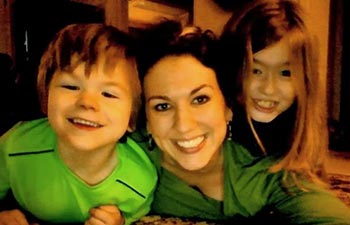 Until she found a lump in her armpit.
Until she found a lump in her armpit.
“The cancer spread so rapidly – from a lump in my armpit, to a lump in my breast in weeks,” Peart explained. “For three weeks, while I was trying to see a doctor and get a diagnosis, two lumps went to eight, and then it spread into my bones. It was extremely fast and frightening.”
She remembers the initial ache of loneliness and isolation that accompanied cancer.
To fight that loneliness and to help her through chemotherapy and surgeries, friends and family members flew in on donated frequent flyer miles. Her ex-husband stepped in and helped with the children.
“Finances were one of the scariest things,” Peart said. “I worried about keeping my home and paying medical bills. Life doesn’t stop because you are going through cancer treatment.”
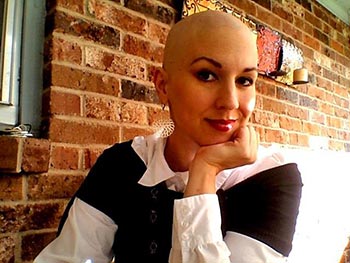 Friends started a Facebook group to rally help, and they were flooded with potential sources and resources. They checked out every tip, matched them to Peart’s needs and filled out mounds of paperwork for her.
Friends started a Facebook group to rally help, and they were flooded with potential sources and resources. They checked out every tip, matched them to Peart’s needs and filled out mounds of paperwork for her.
Generosity flowed.
“SC help.org paid my mortgage for two years. The Susan G. Komen Foundation helped me qualify for Medicaid and paid for surgeries,” Peart said. “A lot of people don’t know about all the help that is available.”
Some of the first things people say when they find out you have cancer is, ‘I have a book,’ or ‘I have a supplement,’ or ‘I have a friend who passed away,’” Peart added. “People – kind people – offer lots of advice, but at first the advice is not helpful at all.”
“I kept thinking, ‘I’m dealing with my own mortality here. I don’t have time to read,’” she added. “The best way to help me is to just be here for me. My friends and family were.”
Peart’s blog also created a path out of loneliness.
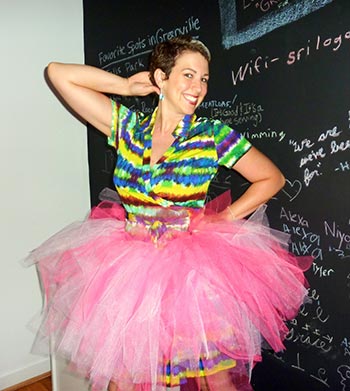 “I took everyone along on the journey,” she said. “I wanted folks to know exactly what I was going through. I wanted them to see behind the scenes.”
“I took everyone along on the journey,” she said. “I wanted folks to know exactly what I was going through. I wanted them to see behind the scenes.”
The seven-year blog bloomed into an exchange of vulnerabilities, research and unconventional conclusions based on the personal experiences of thousands of who had cancer.
Perhaps the most unconventional conclusion that Peart posted on her blog, and others echoed, is her belief that her cancer started with a root canal that went horribly awry. (http://www.anncredible.com/2015/02/do-root-canals-cause-breast-cancer.html)
“The quick explanation is that I had a root canal that went bad in 2010,” Peart explained. “I started to get headaches that would bring me to my knees, tinnitus in my ear and other symptoms that assured me something serious was out of whack.”
“The day the tooth was removed I felt better,” she added. “There was an infection against my jawbone that had been there a long time. A lot had been happening. I worked with biological dentists and did endless hours of research to connect the dots. Any dentist will probably say root canals don’t connect to cancer, but I know what I believe.”
Another “Anncredible” post that struck a chord with followers was Peart’s discussion about dating with cancer.
“I put my bald self up on Bumble and joked that I wasn’t a long-term commitment,” she said.
She received meaningful messages of hope and support – “not the typical dating responses” – she said. “It turned out to be a social experiment that was quite comforting.”
It was really comforting when she met Davie, her current partner – and “The One.”
“He was, and still is, so supportive,” Peart said. “He often says he is sorry that I went through so much of my cancer journey alone. He would have been there. He gets it because he cared for a parent who had cancer.”
In March of 2014, after seven rounds of chemotherapy, four kinds of chemotherapy, six surgeries and 12 infusions, Peart made a decision that proved to be a turning point in her cancer journey.
She said no thanks to her doctor’s recommendation that she roll through radiation treatments and then take hormone-blocking pills for the rest of her life.
She chose to dedicate all of her time and energy into learning about what causes cancer and about how to build her body up so cancer would never come back. She leapt from conventional medicine to holistic, functional medicine.
Drawing from her own journey, research and partnerships with others, Peart spent years managing a functional medicine clinic that included a nutraceutical line of supplements and a commitment to help others reverse chronic illness with a holistic approach.
Of course, she has a blog for this chapter in her life, too: https://connectinghealthydots.blogspot.com/
Peart remains intrigued by concepts such as fasting during chemotherapy.
“Everything is still going through clinical trials, but the concept is that if you fast for three or four days before chemo and up to two days after, our regular cells shut down in starvation mode,” she explained. “So cancer cells are already stressed. With mice, when you added chemo, [to the starved cells] twice as many cells were killed and the mice had longer life spans.”
Today, at age 50, Ann Peart directs business development for Waterstone on Augusta, an assisted living facility in Greenville – and she’s still in remission.
She, her children and Davie know the importance of giving back and that “things we don’t plan will always happen,” she said. “When you know there are bigger things like cancer that can happen, your feathers get less ruffled over little things.”
“We also know to love while we can because nothing is permanent,” she added. “We love while we can big time.”
By Lisa Moody Breslin
Herring Earns Her “A” for Cancer
October 8, 2021
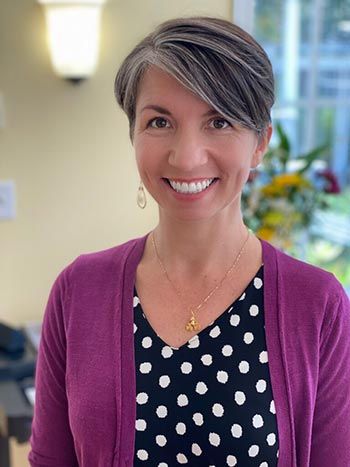 As associate director of development for The American Cancer Society, Sundi Herring was no stranger to breast cancer when she received her own diagnosis on April Fool’s Day last year. She was 44. She had helped her mother and her grandmother battle breast cancer in their 60s.
As associate director of development for The American Cancer Society, Sundi Herring was no stranger to breast cancer when she received her own diagnosis on April Fool’s Day last year. She was 44. She had helped her mother and her grandmother battle breast cancer in their 60s.
“I’ve got this. My mom had this. I’m good,” Herring remembers thinking. “In fact, I’m going to get an ‘A’ in cancer.”
COVID had already flipped the script on life as everyone knew it. Herring was balancing work and home-schooling her children, Maisie and James.
“I knew there was an 87% decline in cancer screenings once COVID hit,” Herring said. “I was due for a mammogram. I knew early detection saves lives, so I remained determined to get screened as soon as possible.”
From screening, to MRIs, to biopsies and then the diagnosis, Herring has walked cancer’s challenging walk, which inspired her to become more vocal and to reach out to more people with the lessons she learned.
“There are great people who help you navigate everything, but they are so inundated, I knew I needed to take the lead for my own journey,” Herring said. “When possible, others should, too.”
She credited Three p’s with her success: partners, patience and persistence.
Her earliest partnerships formed through social media and when she dialed the 800 number for the American Cancer Society.
“It was 2 a.m. I was struggling with the decision to have a unilateral or a bilateral mastectomy; I wanted answers and company,” Herring recalled. “They say it’s a 24/7 hotline and, sure enough, someone picked up. And we talked and talked.”
An oncologist nurse called her back the next day.
“For the first time I felt heard. I got affirmation for my decisions,” Herring said. “I felt like a grownup had entered the room. The cancer society community and communities I joined through social media rallied me and carried me through my darkest days.”
The decision-making stage was the toughest for Herring. She weathered the wait times: waiting to get appointments with doctors, waiting for results, waiting to see if treatments were working.
But making actual decisions about the surgeries and treatments crippled her.
“I was emotionally and physically exhausted. I wasn’t sleeping,” Herring explained. “I couldn’t make decisions when I really needed to.”
“Once I knew what the surgery would be and I had the surgery date, the heaviness went away,” she added. “I felt sure about the surgeon and the plastic surgery. I was ready. The swirling indecision is really the hardest part.”
Metaphors and music were often lifelines for Herring. During MRIs and chemo treatments, she’d listen to songs by Pink.
“The ones when she is mad were the best,” Herring joked. “And I’d listen to Insight Timer – a meditation app – while I was cocooning.”
She did not listen to the news.
As Herring grappled to understand doctor speak, rich comparisons translated for her and helped her laugh along the way.
She recalled this one: “With the early diagnosis, before additional tests revealed the specifics of my cancer, I remember a doctor telling me, ‘We just delivered a pizza to your door. We think that it is pepperoni, but we won’t know until another MRI and some genetic testing. Right now, we know it smells like pizza.”
“A simple metaphor made things seem easier,” she added.
Anyone who is wondering about what it’s like to have cancer will learn quickly that it is a bumpy ride with moments of unimaginable exhaustion.
“But there are lots of tiny victories,” Herring promised.
“I’m too groggy to open a pill bottle, but a neighbor helps me – victory.”
“I walked halfway around the block – victory.”
“I came downstairs and sat at the table – victory.”
“I didn’t sleep in the recliner – victory.”
A big victory for Herring was when she got to reclaim her bedroom after months of it looking like a pharmacy. She packed up the pill bottles and all the sickness-related paraphernalia and put the decorations back up.
“Those little achievements … you have to notice them and be thankful for them,” she said.
Herring remains an icon for raising awareness and funding for cancer-related needs. Hours after this interview, she was bound for a donor dinner. The next day she hosted a talk.
A pink polo shirt, pink socks and lemonade swag for “Squeeze Out Cancer” fill her desk. Her work area reflects Herring’s life before cancer and now, months after her clean pathology report on June 2.
“I’m making more time for magic, for serendipity, for wackiness,” she said. “I always enjoyed wackiness, but only when I had time. Now I make time for it because it makes me feel alive.”
‘“Nothing focuses the mind like approaching scaffold.’ I think Mark Twain said something like that. It’s true,” Herring said. “I feel more focused than I’ve ever felt – like I’m swimming with the flow at the right place at the time. I hope it lasts.”
By Lisa Moody Breslin
Dear Fearless Women
November 5, 2021
Dear Fearless Women,
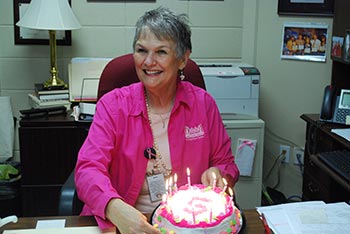 It has been 15 years since my diagnosis of breast cancer launched a journey no one enjoys taking. If I had penned a letter to myself soon after my experience, there are so many things I’d say. This letter is to me, to be tucked away with all the other mementos from my cancer years.
It has been 15 years since my diagnosis of breast cancer launched a journey no one enjoys taking. If I had penned a letter to myself soon after my experience, there are so many things I’d say. This letter is to me, to be tucked away with all the other mementos from my cancer years.
I also dedicate this letter to other women who will have to find their fearless when cancer calls.
When you find a lump or get an unexpected diagnosis after what should have been a routine screening, try not to panic. I didn’t panic, and I didn’t pretend that a lump wasn’t there and would go away. When the first fear hits, become fearless right away. Take a deep breath, call your doctor and get to the office soon – like the next day. You can’t know how to fight until you know what to fight.
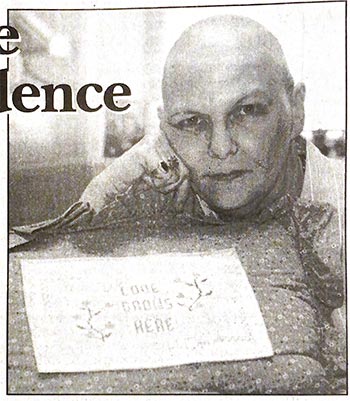 Not knowing is the biggest fearmonger of all.
Not knowing is the biggest fearmonger of all.
Every woman’s diagnosis is different. We know so much more now about breast cancer and its many nuances than in 2006. Just because one woman had a bad experience with treatment doesn’t mean you will. And treatment plans won’t look the same for everyone. A breast cancer diagnosis is not a death sentence if it’s discovered early.
Have someone go with you to the appointments, doctor visits and tests. You need your support system with you, but you also need another set of ears and eyes to hear and process what is being discussed. You think you will remember what was said, but the underlying emotion and apprehension will fog your brain. You need backup.
Let people help you. Accept the offer of meals prepared, errands run and kids watched. Don’t try to be Wonder Woman. You are in a major fight, and you need all your energy and positive thoughts focused on taking care of yourself. It is OK to let others help you. Women are programmed to be all things to everyone in the family. Let go and let them take care of you. It will only be for a season. I had to be knocked flat on my back to realize that I did not have to be all things to all people. Just let go.
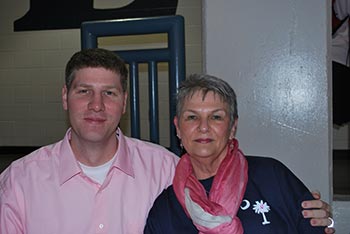 Don’t go on the internet and start Googling your diagnosis and checking into all the chat rooms and forums that are out there. You will be confused, discouraged and scared. And remember – every woman’s diagnosis is different. Depend on the information you get from medical professionals. Know as much as you can about your disease and the treatment protocols, but rely on the information, resources and materials from your doctor and medical team.
Don’t go on the internet and start Googling your diagnosis and checking into all the chat rooms and forums that are out there. You will be confused, discouraged and scared. And remember – every woman’s diagnosis is different. Depend on the information you get from medical professionals. Know as much as you can about your disease and the treatment protocols, but rely on the information, resources and materials from your doctor and medical team.
Going through chemotherapy is no walk in the park, but you can make it better on yourself by letting your medical team advise you on the best foods and beverages to eat and drink. Try to keep active, walk and exercise – with your doctor’s permission, of course. And remember that your chemo nurses are the oncologists’ eyes and ears. If I had it to do over again, I wouldn’t try to keep all the side effects I was having from the Taxol infusions from my doctor, thinking that I had to complete the 12 rounds or I would die. Tell the doctor and nurses what you are experiencing. Side effects are no joke; I could have done some major damage to my body by not being upfront about what was happening.
If I had to do things differently, would it have been better to see the oncologist before opting for the mastectomy? I honestly do not know. It was the best decision for me at the time. I don’t think the treatment plan would have been any different. Today, many women do not have to experience a mastectomy to control their disease. For me, it was a peace of mind decision rather than a medical one. The routine mammogram did not find my tumor. I did not want to live with that uncertainty for the rest of my life. This decision has to be one made by the woman and her medical team.
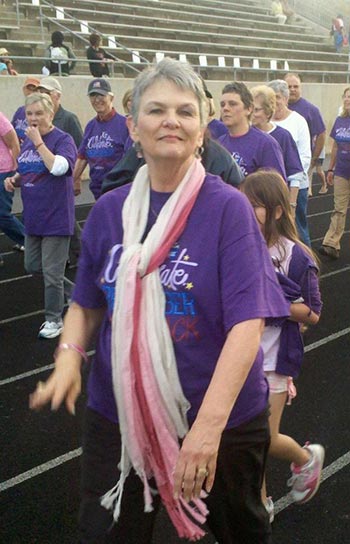 When I could, I worked and did all my usual homemaker activities. Keep a sense of normalcy, but realize that when your body needs rest and says to stop – stop! I had good days but more bad ones. On the good days, I could do most things normally, but, on the bad days, I rested and slept, read and watched movies I’d never had time to watch before
When I could, I worked and did all my usual homemaker activities. Keep a sense of normalcy, but realize that when your body needs rest and says to stop – stop! I had good days but more bad ones. On the good days, I could do most things normally, but, on the bad days, I rested and slept, read and watched movies I’d never had time to watch before
Be an advocate for yourself and know your body. Know what feels right and what seems different. Ask questions. Be vigilant. Take care of your body. Stay on top of your yearly doctor visits. I was that person, and I knew immediately that something wasn’t right.
There is a still a small voice that speaks to us – open your ears and heart and listen.
Finally, join me and take a moment to say thank you to doctors, nurses, researchers, clinicians and anyone else who is working to find better treatments and a cure for cancer – especially breast cancer. I firmly believe that if some of the chemotherapy and immunotherapy regimens I was able to have had not been available, I would not be alive today. Consider donating to organizations that funnel as much money as possible into research and support of those experiencing cancer.
Soon after Thanksgiving Day, I will celebrate my 71st birthday. I remain thankful for the gift of remission. This year, I will hug Harry, my husband of 50-plus years, a little tighter. I’ll tell my sons, Jesse and Andrew, how proud I am to have sons who are educators.
To those who will be the future fearless: Keep listening to your body and your heart. Lean on your faith and all the families that life brings – church families, work families and family families.
Don’t let cancer be a lonely journey; there are so many people to lift you up when you feel down.
Blessings,
Cathy
By Lisa Moody Breslin